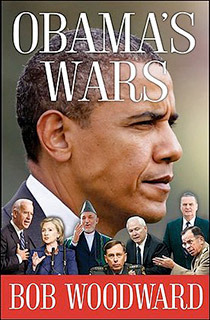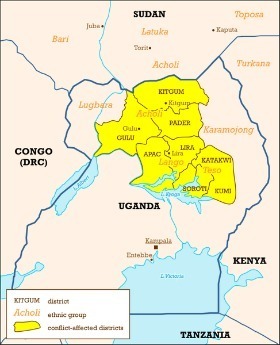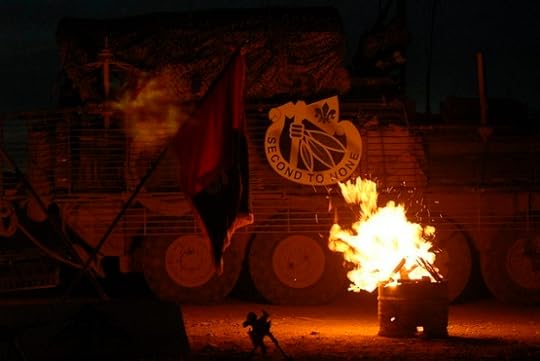Thomas E. Ricks's Blog, page 224
October 19, 2011
Rumelt on strategy (II): His analysis of 'bad strategy' brings to mind Iraq, 2003-06

I found Richard
Rumelt's book
on strategy uneven -- I liked the first half more than the second. Still, there
are interesting and provocative thoughts and insights throughout. Rumelt tends to argue by
assertion, which I like, because you see where he stands and can consider if
his assertion matches your experience.
"Strategy is at least as much about what an organization
does not do as what it does." That's an interesting point to consider in the
context of the current round of defense budget cuts. Also, consider it in terms
of the U.S. involvement in the Libyan rebellion.
One of his strongest chapters is his third, titled "Bad
Strategy," which just by itself is worth the price of admission. Reading it
brought back a lot of memories of 2003-06 in Iraq. "To detect a bad strategy,
look for one or more of its four major hallmarks," he advises. To wit:
Fluff. Fluff is a form of gibberish masquerading as
strategic concepts or arguments."
"Failure to face the challenge. Bad strategy fails to
recognize or define the challenge."
"Mistaking goals for strategy. Many bad strategies are just
statements of desire rather than plans for overcoming obstacles. . . . Bad
strategy is long on goals and short on policy or action. It assumes that goals
are all you need."
Check. Check. Double check.
Hot reading list news: Pakistani army picks 'Obama's Wars' as this year's book

Pakistani's Army Service Book Club every year picks one book
and apparently sends it to all commissioned officers as well as some civilian
officials, with the cost automatically deducted from their salaries.
Interestingly, this
year's pick is Bob Woodward's Obama's
Wars.
Tales of the old Army: Gorman on fighting & kissing at Ft. Benning, soldiers smoking dope during the Korean War, etc.

General Paul Gorman's oral
history is fun for several
aspects, but especially for his unvarnished account of life in the old
Army. First, there was the night he lay drunk in his bed in the Bachelor
Officers' Quarters at Fort Benning, having been out boozing and punching a
warrant officer in the mouth:
I became aware that there was loud talk out in the hall. It
was the warrant officer with a bunch of his buddies. They were coming to find
me to beat out my teeth. I can recall having enough presence of mind to roll
out of bed and get under it. They came in. They were all drunk and they stumbled
around the room. I obviously had been vomiting because they were appalled at
the condition of the floor. They left. In their wake came a captain of the
battalion. He found me under the bed, got me in bed, and cleaned up the room a
little bit. Then the son-of-a-bitch tried to kiss me. I apparently decked him
too.
Arriving at the Korean War front in 1952, Gorman was told by
some soldiers that the company XO was soliciting bribes to give soldiers early
slots for R&R leave in Japan. Gorman, a new lieutenant, went to the company
commander, who was spending most of his time playing poker, and wasn't
interested in pursuing the allegation. So Gorman took care of it himself.
He also says that during the Korean War, the 65th Infantry
Regiment had a bunch of guys who regularly used marijuana. "Every night they
sat back there, puffing away on these weeds." Gorman doesn't mention it, but
the 65th became notorious when many of its soldiers ran away from combat,
resulting in 92 court martials, and eventually the relief of the regiment's
commander.
October 18, 2011
That Westy Top 10 list: Col. Daddis says war is more complex than Sorley thinks

I don't always agree with guest columns I run on this blog,
and this (below) is an example. I disagree with the thesis Col. Daddis offers,
mainly on Clausewitzian grounds. The Prussian teaches us not that war is complex, but that it is simple -- yet so difficult
that even the simplest tasks become hard to execute.
Likewise, strategy is difficult to formulate well -- but if
formulated successfully, its results tend to be reducible to a something easily
understood. So, in World War II: "Europe first." Two words with
enormous implications. I think writing a top 10 list tends to focus the mind,
to force the writer to prioritize and make choices, to distinguish between the
essential and the merely important -- and this is the essence of strategy.
This all brings to mind the conclusion of a memo Eisenhower
and an aide sent to Marshall in March 1942. The three primary goals of the
global war, they wrote, had to be "the security of England, the retention of
Russia in the war as an active war ally, and the defense of the Middle East."
(P. 205, Chandler, Papers of Eisenhower, The War Years.) (Holding the
Mideast prevented the linkup of Germany and Japan and also kept open the supply
line to Russia, at a time when keeping Russia in the war was essential.)
Everything else, including the defense of Australia, was secondary, they noted,
in a classic summary of the nature of strategic decision-making: "All other
operations must be considered highly desirable rather than in the mandatory
class."
And also, as Col. Daddis observes, a top 10 list certainly
can provoke a good discussion. So here he is:
By Col. Gregory A. Daddis
Best Defense guest respondent
Based solely on the responses to Lewis Sorley's Oct. 11
posting on this blog ("The
top ten reasons Gen. Westmoreland lost the war in Vietnam") one reasonably
could conclude that the Vietnam War continues to incite informative discussion,
even passionate debate. These are positive signs for a war which has so much to
offer historians, policy makers, and general readers. If there is anything good
that can come from war-likely a point in itself worth debating-Vietnam suggests
that a reflective reading of the history of armed conflict provides insights
for those looking to the future, a place in which war undoubtedly will reside.
Perhaps that is what is so troubling by Lewis Sorley's
posting and his larger biography
of William C. Westmoreland. If anyone is truly to profit from the study of
the Vietnam War, they must embrace the complexity of that conflict. By reducing
the outcome of the war to one man's failure, and by reducing that failure to a
"top ten" list of mistakes, such commentary oversimplifies an amazingly complex
war. Certainly, it is the historian's task to disentangle the past, but not to
the point of elementariness. If one accepts the unsophisticated thesis that
Westmoreland singlehandedly lost the war in Vietnam, he or she is adopting the
same flawed methodology for which Sorley maligns his target-turning one's back
on the war's complexities, disavowing alternate possibilities, and
underestimating the difficulties of a long and unpopular war.[[BREAK]]
In truth, most all contemporary officers and civilian
leaders understood that the Vietnam War presented unique problems for a nation
so imbued with conventional approaches to warfare. Westmoreland, like all of
the US Army's officers, obviously was a product of his time. To argue, however,
that neither the general nor his peers in uniform understood the war's
intricacies is disingenuous and not supported by the historical record. An
examination of professional journals in the 1960s such as Military Review reveals an officer corps willing to learn about and
experiment with a form of warfare in which they had little experience. Doctrinal
concepts mirrored the complexities being discussed in the armed forces'
professional journals. (Those questioning the army's understanding of
counterinsurgency would be well served by reading the 1967 version of FM 31-16,
Counterguerrilla Operations.) More to
the point, a review of Westmoreland's own concepts of operations and command
guidance similarly exposes a commander who recognized that Vietnam would not be
won by military operations alone. In June 1965, as an example, Westmoreland
outlined his operational concept which noted clearly that the "insurgency in
South Vietnam must eventually be defeated among the people in the hamlets and
towns."
Nor should Westmoreland's use of the word attrition validate
assertions that the American campaign strategy in Vietnam was singularly
focused. In fact, it seems plausible to argue that MACV's commander formulated
a "one war" approach without using the label later popularized by his
successor. Creighton W. Abrams understood the political-military
interrelationships of the war in Vietnam, but so too did Westmoreland.
"Probably the fundamental issue is the question of the coordination of mission
activities in Saigon," the MACV commander opined in early 1966. "It is abundantly
clear that all political, military, economic, and security (police) programs
must be completely integrated in order to attain any kind of success in a
country which has been greatly weakened by prolonged conflict and is under
increasing pressure by large military and subversive forces." Far from being an
officer unwilling to learn about unconventional warfare, Westmoreland
considered the issues of land reform, improving the South Vietnamese armed
forces, limiting civilian casualties, and facilitating population security in
the countryside.
The merits of Westmoreland's generalship will long be
debated, as well they should. We all can profit from reading about how a senior
officer in the United States Army during the 1960s approached a
political-military revolutionary war that at once could be considered a civil
war, a proxy war in the larger Cold War, and a war of northern aggression.
Still, we should debate Westmoreland's merits from a position which embraces
complexity. Carl von Clausewitz understood this better than most and we should
turn to the Prussian theorist as we consider how to approach a study of the
Vietnam War-or any war for that matter. Clausewitz warned that relying on
mathematical factors to understand war is a problematic endeavor. "From the
very start," he cautioned, "there is an interplay of possibilities,
probabilities, good luck and bad that weaves its way throughout the length and
breadth of the tapestry." War is not a simple affair and in the end "top ten"
lists do little to further our understanding of a complex human phenomenon.
Gregory A. Daddis is
an Academy Professor at West Point and author of
No
Sure Victory: Measuring U.S. Army Effectiveness and Progress in the Vietnam War
(Oxford University Press, 2011).
Gen. Gorman's papers: Interesting, and a model for how to present documents

The papers of
retired Gen. Paul Gorman have been placed online.
Recently I spent close to half a day looking through them. Gorman is an
interesting figure, in the middle of things in Korea, in Vietnam and in the
post-Vietnam rebuilding of the Army. I'd never before seen his speech proposing
a kind of National Training Center.
I found the papers
intrinsically interesting, and his
oral history, covering his time in the Korean and Vietnam Wars, as well as
his role in the post-Vietnam rebuilding of the Army, is one of the best I've
read. I'd recommend it especially to anyone interesting in learning about how
to train soldiers.
But I also think
this sort of presentation is a model for presenting the papers of significant
figures. It was like a visit to the Army's Military History Institute -- without
having to drive to Carlisle, Pennsylvania, and eat lunch down the road at
Sheetz's gas station.
Gen. Gorman's papers: Interesting, as well as a model for how to present documents

The papers of
retired Gen. Paul Gorman have been placed online.
Recently I spent close to half a day looking through them. Gorman is an
interesting figure, in the middle of things in Korea, in Vietnam and in the
post-Vietnam rebuilding of the Army. I'd never before seen his speech proposing
a kind of National Training Center.
I found the papers
intrinsically interesting, and his
oral history, covering his time in the Korean and Vietnam Wars, as well as
his role in the post-Vietnam rebuilding of the Army, is one of the best I've
read. I'd recommend it especially to anyone interesting in learning about how
to train soldiers.
But I also think
this sort of presentation is a model for presenting the papers of significant
figures. It was like a visit to the Army's Military History Institute -- without
having to drive to Carlisle, Pennsylvania, and eat lunch down the road at
Sheetz's gas station.
Hey, what could be more American than getting drunk and firing off a few rounds?
Tennessee state Rep. Curry
Todd, who helped clear the way last year to carry handguns into bars, was
busted last week for drunk driving-and carrying a weapon whilst intoxicated. IANMTU.*
Speaking of getting busted, the
Navy fired its 19th commander of the year. Wouldn't it be nice to see similar accountability and transparency in
the Army?
(*--"I Am Not Making This Up.")
October 17, 2011
Deploying to Africa against the LRA

I know some of the little
grasshoppers may disagree with me, but I think that sending
100 Special Forces troops to Africa to coordinate different countries'
operations against the Lord's Resistance Army is a good use of our military.
This is classic "indirect action," and it is a whole lot better than sending
battalions of American infantry. I expect they will introduce unique American
capabilities-such as imagery from satellites and long-loiter drone aircraft-to
help corner the LRA. And because the American commitment is so small, there won't
be a ticking political clock on their deployment. This means the foe can't
simply go to ground and wait out the crackdown. So, unlike in Iraq and
Afghanistan, time is not immediately a factor against the American move.
It also was interesting to me that
this news did not make the front pages of the newspapers I looked at.
Going rogue in Afghanistan: The indiscipline of the 2nd ID's 'kill team'

Adam Ashton of the Tacoma News Tribune has a good
if dismaying piece on the Army platoon from the 5th Brigade, 2nd
Infantry Division, that went rogue in Afghanistan. One of the most striking
sentences: "Twitty found that the soldiers in that platoon came under fire five
times in their year overseas. The Army now considers three of those engagements
to be murders orchestrated by members of the platoon."
There's so much more that it makes you
wonder just where the hell the chain of command was:
*A private destroyed a housing unit on
his base when he accidentally discharged a round from a grenade launcher. His
squad leader had not done the correct checks to make sure all of the weapons
were turned in. The private was Pfc. Andrew Holmes, one of the five "kill team"
codefendants who recently pleaded guilty to killing a noncombatant.
*The entire platoon of nearly 30
soldiers fell asleep in Stryker vehicles outside of a base after a patrol
without posting a night watch. A senior noncommissioned officer caught them
when he watched them through an aerial drone.
*Leaders at multiple levels above 3rd
Platoon failed to conduct routine urinalysis tests and other inspections that
could have identified misconduct earlier.
*Soldiers wrote graffiti at least once,
scrawling the word "crusader" on a road crossing.
*At least one soldier shot dogs and
chickens during patrols.
*Another soldier kept fingers from
corpses in his housing unit and had access to weapons he should have turned in
to his leadership. He was alleged "kill team" ringleader Staff Sgt. Calvin
Gibbs.
*Soldiers used their first names when
they addressed their leaders and showed poor uniform care, even in the context
of relaxed war-zone standards.
*At
least 15 soldiers reported smoking hashish.
Tom again: Part of the answer is that
the platoon's 1st sergeant had TBI and back injuries and didn't go
outside the wire. The platoon leader was a pliable newbie. That still doesn't
answer why the troop and battalion commanders weren't on top of this, perhaps
breaking up the platoon. The brigade commander, Col. Harry Tunnell, has been
cleared. But he was so at
odds with his own chain of command that I have to wonder if he contributed
to the atmosphere of indiscipline. I think an officer in that situation should
be removed without detriment to his career. If General Odierno had done that
with Lt. Col. Nate Sassaman back in 2003, Sassaman might well be a general
today.
What will Iran try next?

Wired' s "Danger
Room" has a fun
contest to guess Iran's next plot against America, such as "Build a giant
horse, fill it with Quds operatives and leave it on the Tijuana side of the
border." My favorite: "Finance Sarah Palin's campaign for President in the 2012
elections."
Thomas E. Ricks's Blog
- Thomas E. Ricks's profile
- 436 followers



